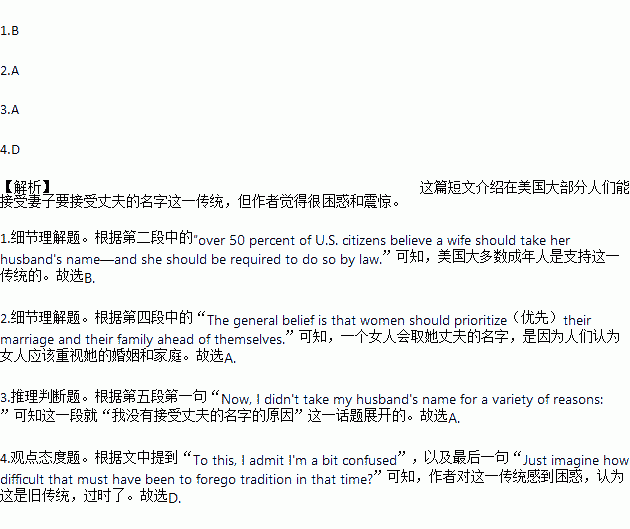题目内容
Before you walked down the aisle—if you even did---did you first agree to take your partner’s name? had you agreed to the bank for updated credit cards, changed your email address, and updated your Facebook?
I didn't; and I know plenty of women out there didn't, either. So I was pretty shocked to learn that in a recent survey, over 50 percent of U.S. citizens believe a wife should take her husband's name—and she should be required to do so by law.
Author Emily Schafer, a sociology professor at Portland State University, surveyed a representative national sample of 1,200 people tar the study, which found that a larger number of American adults think there needs to actually be a law in place to prevent women from keeping their own name.
The most common reason given? The general belief is that women should prioritize(优先)their marriage and their family ahead of themselves. To this, I admit I'm a bit confused, because I don't understand how exactly riot taking your husband’s last name means you aren't prioritizing your marriage.
Now, I didn't take my husband's name for a variety of reasons: I didn’t feel like the name was "mine" and professionally I had built up a reputation as a writer under my maiden(未婚的)name, so I didn't want to lose that. His surname wasn't easy to spell, either; everyone gets it wrong (including my mother—still—and we've been married 13 years).But most of all, I felt like in taking my husband's last name, I was losing a huge sense of self. And while yes, we are a family, I don't want his surname to define me. I'm not his possession.
Just like every aspect of motherhood, each woman should be respected for the choices she makes—without having to do anything by law. And we should all be grateful to Lucy Stone—the first American woman to legally maintain her last name after marriage in 1856.Just imagine how difficult that must have been to forego tradition in that time?
1.What can be learned about the tradition of taking a husband's name from the survey?
A. A law should be there to break the tradition.
B. The majority of American adults support the tradition.
C. The majority of American women go against the tradition.
D. The law requires wives to take their husbands' names in America.
2.Why does an American woman generally take her husband's name?
A. To value her marriage and family.
B. To show honesty to her husband.
C. To join in the family of her husband.
D. To unite a new family under the same name.
3.What does Paragraph 5 mainly talk about?
A. Why the author didn't use her husband's name.
B. Why the author's mother didn't like her husband.
C. How worthy the author's own maiden name was.
D. How bored the author became with her husband's name.
4.What does the author think of the tradition?
A. It's reasonable B. It isn’t worth caring
C. Every coin has two sides D. It's out of date and confusing.

